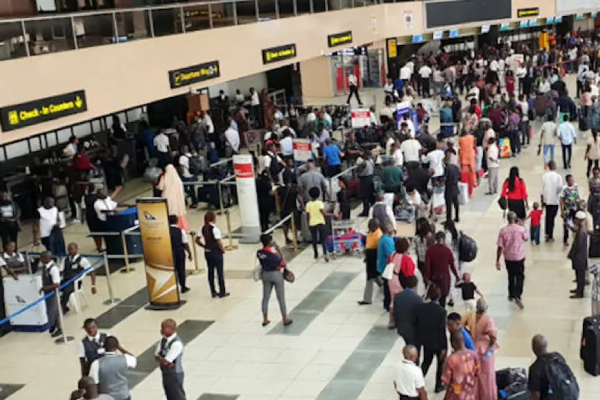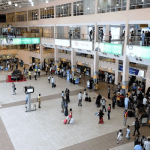Nigeria continues to have high outbound flights despite the exorbitant prices that international airlines charge Nigerian travelers and the difficult economic situation in the nation.
Many Nigerians are still leaving the country, according to some foreign airlines operating in Nigeria, who verified the phenomenon and added that they recently saw full load factors on their departure flights.
[wonderplugin_video iframe=”https://youtu.be/zp98GeRUNWA” lightbox=0 lightboxsize=1 lightboxwidth=960 lightboxheight=540 autoopen=0 autoopendelay=0 autoclose=0 lightboxtitle=”” lightboxgroup=”” lightboxshownavigation=0 showimage=”” lightboxoptions=”” videowidth=600 videoheight=400 keepaspectratio=1 autoplay=0 loop=0 videocss=”position:relative;display:block;background-color:#000;overflow:hidden;max-width:100%;margin:0 auto;” playbutton=”https://www.tvcnews.tv/wp-content/plugins/wonderplugin-video-embed/engine/playvideo-64-64-0.png”]
According to reports, it has become difficult to book tickets on short notice from the majority of foreign airlines that fly into Nigeria, even in economy class, where prices have increased to an average of N1.5 million to N2 million, depending on the airline and destination.
Travel agents say there are higher load on the outbound flights than inbound flights because many Nigerians who travelled do not have the intention to return.
Many corporate organisations have lost their technical and professional staff to the exodus because of the harsh economy.
It was learnt that foreign carriers jerked up airfares because of their inability to repatriate their funds from Nigeria as a result of scarcity of foreign exchange.
A recent study carried out by the Business Travel Management (BTM), the all- in- one business travel platform, explained that normally, foreign airlines that serve Nigeria would sell their tickets in Naira and the Central Bank of Nigeria (CBN) would convert that income to dollars for remittance back to their headquarter locations.
However, currently, due to scarcity of foreign exchange in Nigeria, foreign airlines have the equivalent of over $450 million sitting in Nigeria that cannot be repatriated.
According to the studies, “The consequence of this for Nigerian travelers is that it will lead to lower airline frequencies to, from, and within Nigeria. Several international airlines such as Emirates, British Airways, Air France/KLM, Lufthansa and others have reduced their flight frequencies into Nigeria.
Nigeria continues to have high outbound flights despite the exorbitant prices that international airlines charge Nigerian travelers and the difficult economic situation in the nation.
Many Nigerians are still leaving the country, according to some foreign airlines operating in Nigeria, who verified the phenomenon and added that they recently saw full load factors on their departure flights.
[wonderplugin_video iframe=”https://youtu.be/zp98GeRUNWA” lightbox=0 lightboxsize=1 lightboxwidth=960 lightboxheight=540 autoopen=0 autoopendelay=0 autoclose=0 lightboxtitle=”” lightboxgroup=”” lightboxshownavigation=0 showimage=”” lightboxoptions=”” videowidth=600 videoheight=400 keepaspectratio=1 autoplay=0 loop=0 videocss=”position:relative;display:block;background-color:#000;overflow:hidden;max-width:100%;margin:0 auto;” playbutton=”https://www.tvcnews.tv/wp-content/plugins/wonderplugin-video-embed/engine/playvideo-64-64-0.png”]
According to reports, it has become difficult to book tickets on short notice from the majority of foreign airlines that fly into Nigeria, even in economy class, where prices have increased to an average of N1.5 million to N2 million, depending on the airline and destination.
Travel agents say there are higher load on the outbound flights than inbound flights because many Nigerians who travelled do not have the intention to return.
Many corporate organisations have lost their technical and professional staff to the exodus because of the harsh economy.
It was learnt that foreign carriers jerked up airfares because of their inability to repatriate their funds from Nigeria as a result of scarcity of foreign exchange.
A recent study carried out by the Business Travel Management (BTM), the all- in- one business travel platform, explained that normally, foreign airlines that serve Nigeria would sell their tickets in Naira and the Central Bank of Nigeria (CBN) would convert that income to dollars for remittance back to their headquarter locations.
However, currently, due to scarcity of foreign exchange in Nigeria, foreign airlines have the equivalent of over $450 million sitting in Nigeria that cannot be repatriated.
According to the studies, “The consequence of this for Nigerian travelers is that it will lead to lower airline frequencies to, from, and within Nigeria. Several international airlines such as Emirates, British Airways, Air France/KLM, Lufthansa and others have reduced their flight frequencies into Nigeria.
Nigeria continues to have high outbound flights despite the exorbitant prices that international airlines charge Nigerian travelers and the difficult economic situation in the nation.
Many Nigerians are still leaving the country, according to some foreign airlines operating in Nigeria, who verified the phenomenon and added that they recently saw full load factors on their departure flights.
[wonderplugin_video iframe=”https://youtu.be/zp98GeRUNWA” lightbox=0 lightboxsize=1 lightboxwidth=960 lightboxheight=540 autoopen=0 autoopendelay=0 autoclose=0 lightboxtitle=”” lightboxgroup=”” lightboxshownavigation=0 showimage=”” lightboxoptions=”” videowidth=600 videoheight=400 keepaspectratio=1 autoplay=0 loop=0 videocss=”position:relative;display:block;background-color:#000;overflow:hidden;max-width:100%;margin:0 auto;” playbutton=”https://www.tvcnews.tv/wp-content/plugins/wonderplugin-video-embed/engine/playvideo-64-64-0.png”]
According to reports, it has become difficult to book tickets on short notice from the majority of foreign airlines that fly into Nigeria, even in economy class, where prices have increased to an average of N1.5 million to N2 million, depending on the airline and destination.
Travel agents say there are higher load on the outbound flights than inbound flights because many Nigerians who travelled do not have the intention to return.
Many corporate organisations have lost their technical and professional staff to the exodus because of the harsh economy.
It was learnt that foreign carriers jerked up airfares because of their inability to repatriate their funds from Nigeria as a result of scarcity of foreign exchange.
A recent study carried out by the Business Travel Management (BTM), the all- in- one business travel platform, explained that normally, foreign airlines that serve Nigeria would sell their tickets in Naira and the Central Bank of Nigeria (CBN) would convert that income to dollars for remittance back to their headquarter locations.
However, currently, due to scarcity of foreign exchange in Nigeria, foreign airlines have the equivalent of over $450 million sitting in Nigeria that cannot be repatriated.
According to the studies, “The consequence of this for Nigerian travelers is that it will lead to lower airline frequencies to, from, and within Nigeria. Several international airlines such as Emirates, British Airways, Air France/KLM, Lufthansa and others have reduced their flight frequencies into Nigeria.
Nigeria continues to have high outbound flights despite the exorbitant prices that international airlines charge Nigerian travelers and the difficult economic situation in the nation.
Many Nigerians are still leaving the country, according to some foreign airlines operating in Nigeria, who verified the phenomenon and added that they recently saw full load factors on their departure flights.
[wonderplugin_video iframe=”https://youtu.be/zp98GeRUNWA” lightbox=0 lightboxsize=1 lightboxwidth=960 lightboxheight=540 autoopen=0 autoopendelay=0 autoclose=0 lightboxtitle=”” lightboxgroup=”” lightboxshownavigation=0 showimage=”” lightboxoptions=”” videowidth=600 videoheight=400 keepaspectratio=1 autoplay=0 loop=0 videocss=”position:relative;display:block;background-color:#000;overflow:hidden;max-width:100%;margin:0 auto;” playbutton=”https://www.tvcnews.tv/wp-content/plugins/wonderplugin-video-embed/engine/playvideo-64-64-0.png”]
According to reports, it has become difficult to book tickets on short notice from the majority of foreign airlines that fly into Nigeria, even in economy class, where prices have increased to an average of N1.5 million to N2 million, depending on the airline and destination.
Travel agents say there are higher load on the outbound flights than inbound flights because many Nigerians who travelled do not have the intention to return.
Many corporate organisations have lost their technical and professional staff to the exodus because of the harsh economy.
It was learnt that foreign carriers jerked up airfares because of their inability to repatriate their funds from Nigeria as a result of scarcity of foreign exchange.
A recent study carried out by the Business Travel Management (BTM), the all- in- one business travel platform, explained that normally, foreign airlines that serve Nigeria would sell their tickets in Naira and the Central Bank of Nigeria (CBN) would convert that income to dollars for remittance back to their headquarter locations.
However, currently, due to scarcity of foreign exchange in Nigeria, foreign airlines have the equivalent of over $450 million sitting in Nigeria that cannot be repatriated.
According to the studies, “The consequence of this for Nigerian travelers is that it will lead to lower airline frequencies to, from, and within Nigeria. Several international airlines such as Emirates, British Airways, Air France/KLM, Lufthansa and others have reduced their flight frequencies into Nigeria.
Nigeria continues to have high outbound flights despite the exorbitant prices that international airlines charge Nigerian travelers and the difficult economic situation in the nation.
Many Nigerians are still leaving the country, according to some foreign airlines operating in Nigeria, who verified the phenomenon and added that they recently saw full load factors on their departure flights.
[wonderplugin_video iframe=”https://youtu.be/zp98GeRUNWA” lightbox=0 lightboxsize=1 lightboxwidth=960 lightboxheight=540 autoopen=0 autoopendelay=0 autoclose=0 lightboxtitle=”” lightboxgroup=”” lightboxshownavigation=0 showimage=”” lightboxoptions=”” videowidth=600 videoheight=400 keepaspectratio=1 autoplay=0 loop=0 videocss=”position:relative;display:block;background-color:#000;overflow:hidden;max-width:100%;margin:0 auto;” playbutton=”https://www.tvcnews.tv/wp-content/plugins/wonderplugin-video-embed/engine/playvideo-64-64-0.png”]
According to reports, it has become difficult to book tickets on short notice from the majority of foreign airlines that fly into Nigeria, even in economy class, where prices have increased to an average of N1.5 million to N2 million, depending on the airline and destination.
Travel agents say there are higher load on the outbound flights than inbound flights because many Nigerians who travelled do not have the intention to return.
Many corporate organisations have lost their technical and professional staff to the exodus because of the harsh economy.
It was learnt that foreign carriers jerked up airfares because of their inability to repatriate their funds from Nigeria as a result of scarcity of foreign exchange.
A recent study carried out by the Business Travel Management (BTM), the all- in- one business travel platform, explained that normally, foreign airlines that serve Nigeria would sell their tickets in Naira and the Central Bank of Nigeria (CBN) would convert that income to dollars for remittance back to their headquarter locations.
However, currently, due to scarcity of foreign exchange in Nigeria, foreign airlines have the equivalent of over $450 million sitting in Nigeria that cannot be repatriated.
According to the studies, “The consequence of this for Nigerian travelers is that it will lead to lower airline frequencies to, from, and within Nigeria. Several international airlines such as Emirates, British Airways, Air France/KLM, Lufthansa and others have reduced their flight frequencies into Nigeria.
Nigeria continues to have high outbound flights despite the exorbitant prices that international airlines charge Nigerian travelers and the difficult economic situation in the nation.
Many Nigerians are still leaving the country, according to some foreign airlines operating in Nigeria, who verified the phenomenon and added that they recently saw full load factors on their departure flights.
[wonderplugin_video iframe=”https://youtu.be/zp98GeRUNWA” lightbox=0 lightboxsize=1 lightboxwidth=960 lightboxheight=540 autoopen=0 autoopendelay=0 autoclose=0 lightboxtitle=”” lightboxgroup=”” lightboxshownavigation=0 showimage=”” lightboxoptions=”” videowidth=600 videoheight=400 keepaspectratio=1 autoplay=0 loop=0 videocss=”position:relative;display:block;background-color:#000;overflow:hidden;max-width:100%;margin:0 auto;” playbutton=”https://www.tvcnews.tv/wp-content/plugins/wonderplugin-video-embed/engine/playvideo-64-64-0.png”]
According to reports, it has become difficult to book tickets on short notice from the majority of foreign airlines that fly into Nigeria, even in economy class, where prices have increased to an average of N1.5 million to N2 million, depending on the airline and destination.
Travel agents say there are higher load on the outbound flights than inbound flights because many Nigerians who travelled do not have the intention to return.
Many corporate organisations have lost their technical and professional staff to the exodus because of the harsh economy.
It was learnt that foreign carriers jerked up airfares because of their inability to repatriate their funds from Nigeria as a result of scarcity of foreign exchange.
A recent study carried out by the Business Travel Management (BTM), the all- in- one business travel platform, explained that normally, foreign airlines that serve Nigeria would sell their tickets in Naira and the Central Bank of Nigeria (CBN) would convert that income to dollars for remittance back to their headquarter locations.
However, currently, due to scarcity of foreign exchange in Nigeria, foreign airlines have the equivalent of over $450 million sitting in Nigeria that cannot be repatriated.
According to the studies, “The consequence of this for Nigerian travelers is that it will lead to lower airline frequencies to, from, and within Nigeria. Several international airlines such as Emirates, British Airways, Air France/KLM, Lufthansa and others have reduced their flight frequencies into Nigeria.
Nigeria continues to have high outbound flights despite the exorbitant prices that international airlines charge Nigerian travelers and the difficult economic situation in the nation.
Many Nigerians are still leaving the country, according to some foreign airlines operating in Nigeria, who verified the phenomenon and added that they recently saw full load factors on their departure flights.
[wonderplugin_video iframe=”https://youtu.be/zp98GeRUNWA” lightbox=0 lightboxsize=1 lightboxwidth=960 lightboxheight=540 autoopen=0 autoopendelay=0 autoclose=0 lightboxtitle=”” lightboxgroup=”” lightboxshownavigation=0 showimage=”” lightboxoptions=”” videowidth=600 videoheight=400 keepaspectratio=1 autoplay=0 loop=0 videocss=”position:relative;display:block;background-color:#000;overflow:hidden;max-width:100%;margin:0 auto;” playbutton=”https://www.tvcnews.tv/wp-content/plugins/wonderplugin-video-embed/engine/playvideo-64-64-0.png”]
According to reports, it has become difficult to book tickets on short notice from the majority of foreign airlines that fly into Nigeria, even in economy class, where prices have increased to an average of N1.5 million to N2 million, depending on the airline and destination.
Travel agents say there are higher load on the outbound flights than inbound flights because many Nigerians who travelled do not have the intention to return.
Many corporate organisations have lost their technical and professional staff to the exodus because of the harsh economy.
It was learnt that foreign carriers jerked up airfares because of their inability to repatriate their funds from Nigeria as a result of scarcity of foreign exchange.
A recent study carried out by the Business Travel Management (BTM), the all- in- one business travel platform, explained that normally, foreign airlines that serve Nigeria would sell their tickets in Naira and the Central Bank of Nigeria (CBN) would convert that income to dollars for remittance back to their headquarter locations.
However, currently, due to scarcity of foreign exchange in Nigeria, foreign airlines have the equivalent of over $450 million sitting in Nigeria that cannot be repatriated.
According to the studies, “The consequence of this for Nigerian travelers is that it will lead to lower airline frequencies to, from, and within Nigeria. Several international airlines such as Emirates, British Airways, Air France/KLM, Lufthansa and others have reduced their flight frequencies into Nigeria.
Nigeria continues to have high outbound flights despite the exorbitant prices that international airlines charge Nigerian travelers and the difficult economic situation in the nation.
Many Nigerians are still leaving the country, according to some foreign airlines operating in Nigeria, who verified the phenomenon and added that they recently saw full load factors on their departure flights.
[wonderplugin_video iframe=”https://youtu.be/zp98GeRUNWA” lightbox=0 lightboxsize=1 lightboxwidth=960 lightboxheight=540 autoopen=0 autoopendelay=0 autoclose=0 lightboxtitle=”” lightboxgroup=”” lightboxshownavigation=0 showimage=”” lightboxoptions=”” videowidth=600 videoheight=400 keepaspectratio=1 autoplay=0 loop=0 videocss=”position:relative;display:block;background-color:#000;overflow:hidden;max-width:100%;margin:0 auto;” playbutton=”https://www.tvcnews.tv/wp-content/plugins/wonderplugin-video-embed/engine/playvideo-64-64-0.png”]
According to reports, it has become difficult to book tickets on short notice from the majority of foreign airlines that fly into Nigeria, even in economy class, where prices have increased to an average of N1.5 million to N2 million, depending on the airline and destination.
Travel agents say there are higher load on the outbound flights than inbound flights because many Nigerians who travelled do not have the intention to return.
Many corporate organisations have lost their technical and professional staff to the exodus because of the harsh economy.
It was learnt that foreign carriers jerked up airfares because of their inability to repatriate their funds from Nigeria as a result of scarcity of foreign exchange.
A recent study carried out by the Business Travel Management (BTM), the all- in- one business travel platform, explained that normally, foreign airlines that serve Nigeria would sell their tickets in Naira and the Central Bank of Nigeria (CBN) would convert that income to dollars for remittance back to their headquarter locations.
However, currently, due to scarcity of foreign exchange in Nigeria, foreign airlines have the equivalent of over $450 million sitting in Nigeria that cannot be repatriated.
According to the studies, “The consequence of this for Nigerian travelers is that it will lead to lower airline frequencies to, from, and within Nigeria. Several international airlines such as Emirates, British Airways, Air France/KLM, Lufthansa and others have reduced their flight frequencies into Nigeria.














